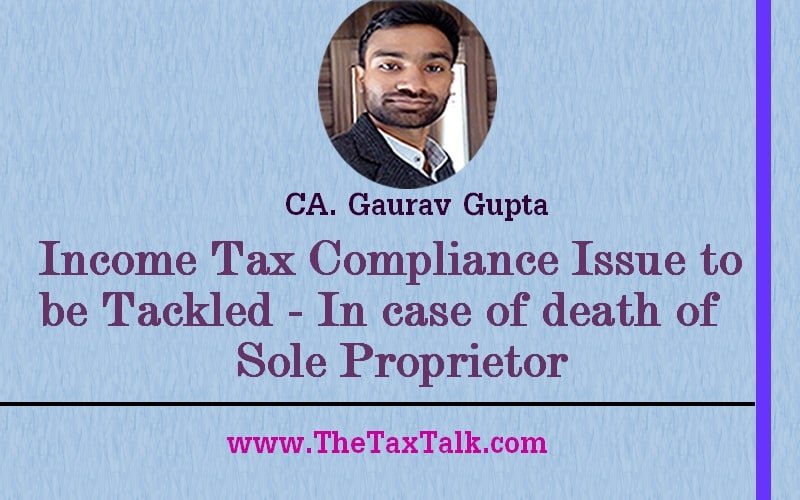![]()
Income Tax Compliance Issue to be Tackled – In case of death of Sole Proprietor
About The Author
CA. Gaurav Gupta
CS, MCom, BCom, NCFM(MF).
Income Tax Compliances are Pan No. based. There is no other separate registration required for Income tax compliances. In case of death of sole proprietor there is requirement of the legal heir to register himself on the e-filling portal as a legal heir of the assessee.
on the other hand, GST registration is PAN-based registration. In case of death of sole proprietor, if the business is intended to be carried on by successor or legal heir, the successor can’t do so using the same GST registration since the successor will have a different PAN. Thus, the successor needs to take a new GST Registration if not already registered and also ensure that the balance of ITC lying in the electronic credit ledger of the sole proprietor is transferred to him. Also, the successor has to file the application for cancellation of GST registration on account of death of sole proprietor. In this article we will discuss the various compliances to be considered after the death of sole proprietor.
Income Tax Compliance to be made after death of sole proprietor
As per Section 159 of the Income Tax Act, 1961, if an assessee dies before filing income tax return of any year in which a filing of return is required , it becomes the liability of the legal representative/spouse/executor to file the income tax return and pay-off any remaining tax dues of the deceased assessee. A deceased person is entitled to all the deductions and exemptions for the entire year, but tax is levied only on the income earned till his/her death. However, the return of the deceased would include income till the date of death of assessee, hereafter the income would be taxable in the hands of the legal heirs. So, the filing of tax returns becomes the responsibility of the Legal Heir. This means the legal heir can file the tax returns on behalf of the deceased assessee.
In case of death of the assessee the legal heir has to register himself on the e-filing portal as legal heir of the assessee and file the return on behalf of the assessee the following is the procedure to register as legal heir on e-filing website:
Step 1: Log in to ‘e-Filing’ Portal www.incometaxindiaefiling.gov.in using Login Credentials of yours i.e., Legal Heir
Step 2: Now, under “My Account” tab Select, “Register as Representative” Option
You will be redirected to Register as Representative page
Step 3: Now, Select, Request type as new request and Category to register as “Deceased (Legal Heir) and Click on “Proceed” button
Step 4: Now enter the below details:
- Pan of the Deceased
- Name and Date of Birth of the Deceased as per PAN
- Bank details of the Legal Heir
- Upload the relevant documents
Once the above details are filled and uploaded click on ‘Submit’ button. A Success Message will be displayed confirming the submission of Register as authorized signatory Request. Request will be sent to the e-Filing Admin for approval. The e-Filing Admin will check the authenticity of the request details and may Approve/Reject the request and Upon Approval/Rejection, an e-mail and SMS will be sent to the user who raised the request.
Note:
- The registration of Legal Heir is for the purpose of filing income tax return on behalf of the deceased person.
- Upload the following documents in PDF format (Maximum 1 MB) –
- Death Certificate.
- PAN card of the deceased,
- PAN card copy of Legal Heir and
- Legal Heir certificate
Note: If You don’t hold physical copy of pan card of Deceased than you have to upload a Affidavit for the same.
- Following documents will be accepted a legal heir certificate.
- The legal heir certificate issued by court of law.
- The legal heir certificate issued by the Local revenue authorities.
- The surviving family members certificate issued by the local revenue authorities.
- The registered will.
- The Family pension certificate issued by the State/Central government.
- Letter issued by the Banking or Financial Institution in their letter Head with Seal and signature mentioning the particulars of nominee or joint account holder to the account of the deceased at the time of demise.
- To provide the Hindi/English Translation version of the will/Legal Heir certificate. duly notarised. along with copy of the original certificate.
Income Tax Act on Your Mobile Now Android Application For Income Tax Act – 1961 with Cost Inflation Index and other tools on Mobile now at following link:
Whatsapp Group at






